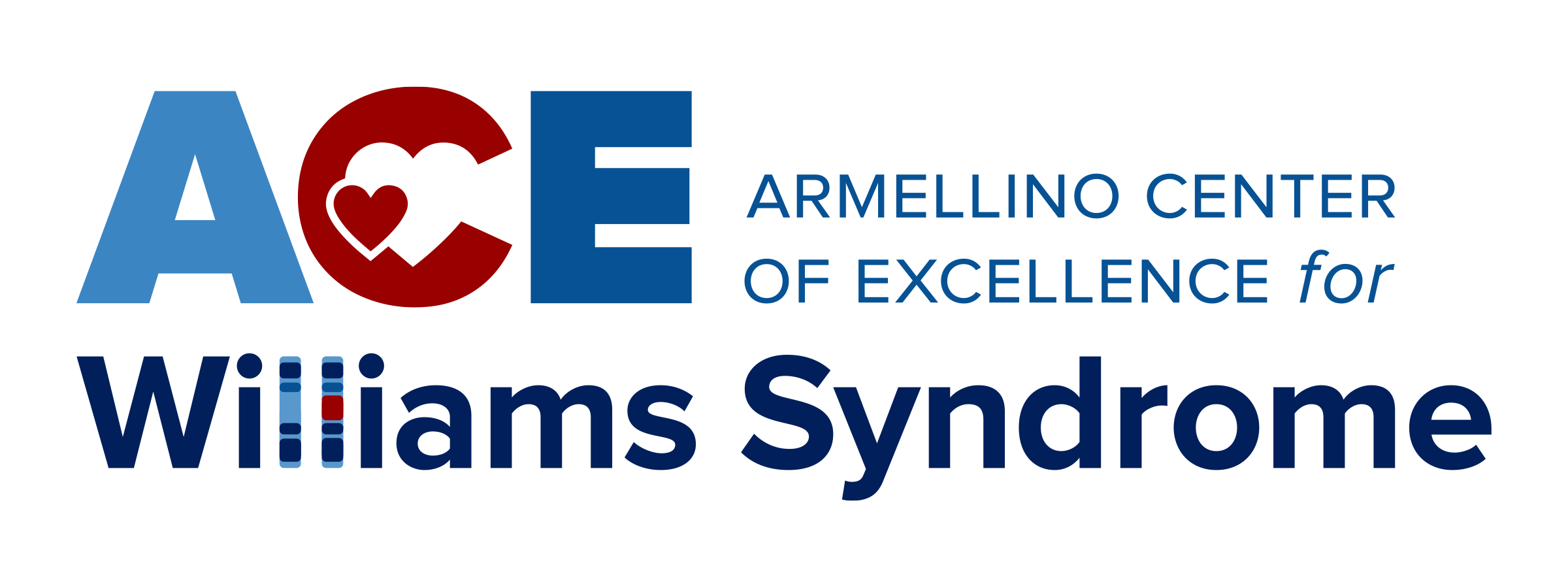Development of Language, Cognition, and Adaptive Behavior
What are the goals of this study?
The purpose of the study is to delineate the development of language, cognition, personality, literacy and mathematics skills, and adaptive behavior from very early childhood through adulthood in individuals who have WS. The research also aims to determine the predictors of specific aspects of development (e.g., word reading ability, language ability, spatial ability) for individuals with WS. In the long term, findings are expected not only to contribute to theories of development but also to provide a solid basis for the design of interventions to facilitate the acquisition of language, literacy, math skills, and adaptive behavior skills for individuals with WS.
Who can be a part of this research study?
At this time, recruitment is very limited as there are few appointments available.
New enrollment in the study is currently open to the following groups:
- Individuals with WS who previously participated in the study at the University of Louisville, regardless of their current age.
- Individuals with WS ages 6 ½ - 17 years old
- Please note that while you may enroll a child at age 6 ½, their first appointment will not occur until the day after their 7th birthday, at the earliest.
- Individuals with WS who have a shorter deletion in their DNA than what is typical for WS, regardless of age
- The classical deletion in Williams syndrome is 1.4 – 1.8 megabases. The length of the deletion can be determined by a chromosomal microarray, which is one of the methods used to formally diagnose Williams syndrome. For our purposes, any individual with WS who has a deletion length of less than 1.3 megabases would be considered to have a short deletion.
Please note:
- Adults with WS who have not previously participated in this study are not eligible to join at this time.
- While we are not currently enrolling children with classic deletions who are under the age of 6 ½ years, we welcome you to reach out to be put on a waitlist for when your child is older. We may also contact you if we are able to enroll younger children in the future.
What will you be asked to do?
- Attend in-person visits:
- Annually or twice a year for infants and toddlers
- Annually for young children
- Every 2-3 years for older children and adolescent
- Every 3-5 years for adults
We expect that your participation in this research will be ongoing unless you withdraw.
- The length of the research visit varies based on age:
- For children < 4 years old and for adults: visit will be 1 day
- For children 4 – 17 years old: visit will be 1½ - 2 days
- Parents or caregivers will be asked to complete questionnaires and interviews regarding the personality, behavioral characteristics, and adaptive skills of the participant. Parents of children with WS also will be asked to complete a few questionnaires about the sibling closest in age to their child with WS.
- Participants will be asked to complete standardized assessments of cognition and language administered by specially trained researchers:
- For children < 4 years old, the assessment will take about 2-3 hours
- Beginning at age 4, the assessment may take as long as 6-10 hours (excluding breaks). The assessment will be conducted over 1 ½ or 2 days to accommodate the participant’s attention span. Breaks will be provided as needed.
- Participate in researcher-designed activities administered to measure spontaneous language abilities and mastery motivation. For young children, this may include a parent-child play session.
What are the benefits of taking part in this research study?
-
· Parents who have participated in similar studies often report that as a result of participation, they become more aware of their child’s abilities and the progress that their child is making.
-
The knowledge gained from this research may help in designing interventions and educational plans specifically for children with WS, and more generally for children with developmental delay, intellectual disabilities, or learning difficulties.
-
The information collected may or may not benefit you and your child directly. The information learned may be helpful to others, as it might help us better understand the processes involved in language, cognitive, literacy and math, personality, and behavioral development.
Will I be paid for taking part in this study?
- No
I'm interested! How do I participate?
If you have any questions, would like to join the research study, or would like to be put on the waitlist (for children younger than 6 ½ years), please contact: ace-ws-research@pennmedicine.upenn.edu or call 888-722-3497 for more information!





